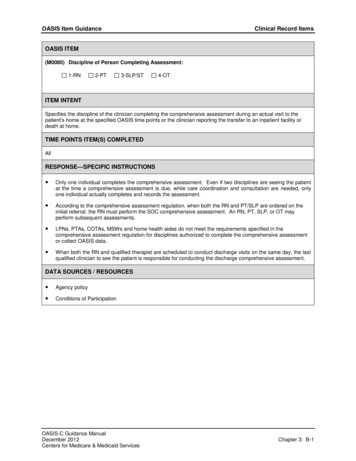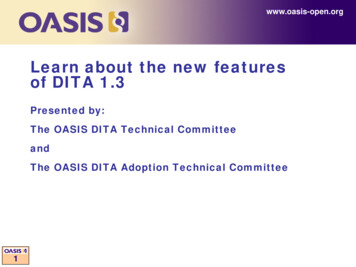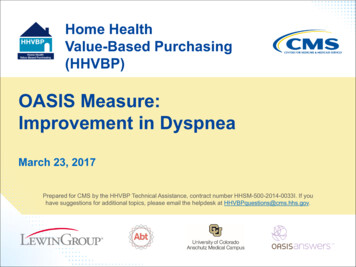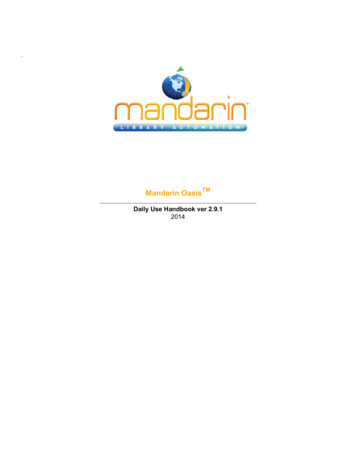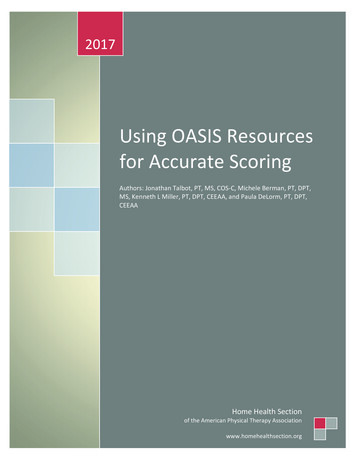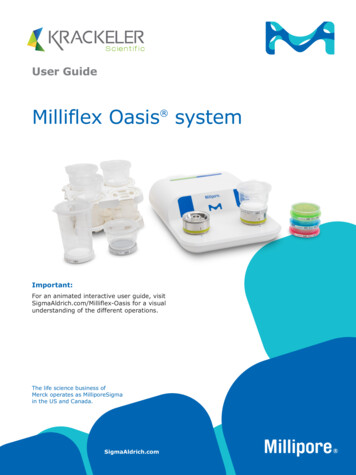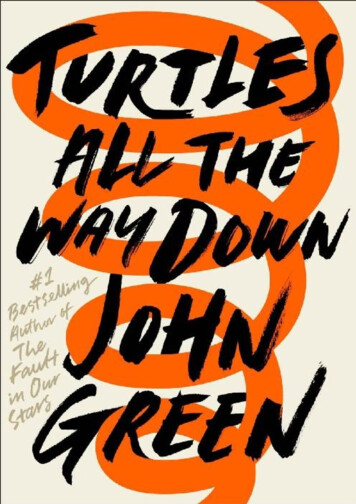
Transcription
ALSO BY JOHN GREEN:Looking for AlaskaAn Abundance of KatherinesPaper TownsWill Grayson, Will GraysonWITH DAVID LEVITHANThe Fault in Our Stars
DUTTON BOOKSAn imprint of Penguin Random House LLC375 Hudson StreetNew York, NY 10014Copyright 2017 by John GreenJacket design 2017 by Rodrigo CorralPenguin supports copyright.Copyright fuels creativity, encourages diverse voices, promotes free speech, and creates a vibrant culture. Thank you for buyingan authorized edition of this book and for complying with copyright laws by not reproducing, scanning, or distributing any part ofit in any form without permission. You are supporting writers and allowing Penguin to continue to publish books for every reader.CIP Data is availableEbook ISBN 9780525555353Edited by Julie Strauss-GabelThis is a work of fiction. Names, characters, places, and incidents either are the product of the author’s imagination or are usedfictitiously, and any resemblance to actual persons, living or dead, businesses, companies, events, or locales is entirelycoincidental.Version 1
To Henry and Alice
CONTENTSALSO BY JOHN GREENTITLE FTEENSIXTEENSEVENTEENEIGHTEENNINETEEN
CKNOWLEDGMENTS
Man can do what he wills,but he cannot will what he wills.—ARTHUR SCHOPENHAUER
ONEI might be fictional, my weekdays were spent ata publicly funded institution on the north side of Indianapolis called WhiteRiver High School, where I was required to eat lunch at a particular time—between 12:37 P.M. and 1:14 P.M.—by forces so much larger than myself that Icouldn’t even begin to identify them. If those forces had given me a differentlunch period, or if the tablemates who helped author my fate had chosen adifferent topic of conversation that September day, I would’ve met a differentend—or at least a different middle. But I was beginning to learn that your lifeis a story told about you, not one that you tell.AT THE TIME I FIRST REALIZEDOf course, you pretend to be the author. You have to. You think, I nowchoose to go to lunch, when that monotone beep rings from on high at 12:37.But really, the bell decides. You think you’re the painter, but you’re thecanvas.Hundreds of voices were shouting over one another in the cafeteria, sothat the conversation became mere sound, the rushing of a river over rocks.And as I sat beneath fluorescent cylinders spewing aggressively artificiallight, I thought about how we all believed ourselves to be the hero of somepersonal epic, when in fact we were basically identical organisms colonizing avast and windowless room that smelled of Lysol and lard.I was eating a peanut butter and honey sandwich and drinking a DrPepper. To be honest, I find the whole process of masticating plants andanimals and then shoving them down my esophagus kind of disgusting, so Iwas trying not to think about the fact that I was eating, which is a form ofthinking about it.Across the table from me, Mychal Turner was scribbling in a yellowpaper notebook. Our lunch table was like a long-running play on Broadway:The cast changed over the years, but the roles never did. Mychal was TheArtsy One. He was talking with Daisy Ramirez, who’d played the role of myBest and Most Fearless Friend since elementary school, but I couldn’t followtheir conversation over the noise of all the others.What was my part in this play? The Sidekick. I was Daisy’s Friend, orMs. Holmes’s Daughter. I was somebody’s something.
I felt my stomach begin to work on the sandwich, and even overeverybody’s talking, I could hear it digesting, all the bacteria chewing theslime of peanut butter—the students inside of me eating at my internalcafeteria. A shiver convulsed through me.“Didn’t you go to camp with him?” Daisy asked me.“With who?”“Davis Pickett,” she said.“Yeah,” I said. “Why?”“Aren’t you listening?” Daisy asked. I am listening, I thought, to thecacophony of my digestive tract. Of course I’d long known that I was playinghost to a massive collection of parasitic organisms, but I didn’t much likebeing reminded of it. By cell count, humans are approximately 50 percentmicrobial, meaning that about half of the cells that make you up are not yoursat all. There are something like a thousand times more microbes living in myparticular biome than there are human beings on earth, and it often seems likeI can feel them living and breeding and dying in and on me. I wiped mysweaty palms on my jeans and tried to control my breathing. Admittedly, Ihave some anxiety problems, but I would argue it isn’t irrational to beconcerned about the fact that you are a skin-encased bacterial colony.Mychal said, “His dad was about to be arrested for bribery or something,but the night before the raid he disappeared. There’s a hundred-thousanddollar reward out for him.”“And you know his kid,” Daisy said.“Knew him,” I answered.I watched Daisy attack her school-provided rectangular pizza and greenbeans with a fork. She kept glancing up at me, her eyes widening as if to say,Well? I could tell she wanted me to ask her about something, but I couldn’ttell what, because my stomach wouldn’t shut up, which was forcing me deepinside a worry that I’d somehow contracted a parasitic infection.I could half hear Mychal telling Daisy about his new art project, in whichhe was using Photoshop to average the faces of a hundred people namedMychal, and the average of their faces would be this new, one-hundred-andfirst Mychal, which was an interesting idea, and I wanted to listen, but thecafeteria was so loud, and I couldn’t stop wondering whether there wassomething wrong with the microbial balance of power inside me.Excessive abdominal noise is an uncommon, but not unprecedented,presenting symptom of infection with the bacteria Clostridium difficile, which
can be fatal. I pulled out my phone and searched “human microbiome” toreread Wikipedia’s introduction to the trillions of microorganisms currentlyinside me. I clicked over to the article about C. diff, scrolling to the part abouthow most C. diff infections occur in hospitals. I scrolled down farther to a listof symptoms, none of which I had, except for the excessive abdominal noises,although I knew from previous searches that the Cleveland Clinic hadreported the case of one person who’d died of C. diff after presenting at thehospital with only abdominal pain and fever. I reminded myself that I didn’thave a fever, and my self replied: You don’t have a fever YET.At the cafeteria, where a shrinking slice of my consciousness still resided,Daisy was telling Mychal that his averaging project shouldn’t be about peoplenamed Mychal but about imprisoned men who’d later been exonerated. “It’llbe easier, anyway,” she said, “because they all have mug shots taken from thesame angle, and then it’s not just about names but about race and class andmass incarceration,” and Mychal was like, “You’re a genius, Daisy,” and shesaid, “You sound surprised,” and meanwhile I was thinking that if half thecells inside of you are not you, doesn’t that challenge the whole notion of meas a singular pronoun, let alone as the author of my fate? And I fell pretty fardown that recursive wormhole until it transported me completely out of theWhite River High School cafeteria into some non-sensorial place onlyproperly crazy people get to visit.Ever since I was little, I’ve pressed my right thumbnail into the finger padof my middle finger, and so now there’s this weird callus over my fingerprint.After so many years of doing this, I can open up a crack in the skin reallyeasily, so I cover it up with a Band-Aid to try to prevent infection. Butsometimes I get worried that there already is an infection, and so I need todrain it, and the only way to do that is to reopen the wound and press out anyblood that will come. Once I start thinking about splitting the skin apart, Iliterally cannot not do it. I apologize for the double negative, but it’s a realdouble negative of a situation, a bind from which negating the negation istruly the only escape. So anyway, I started to want to feel my thumbnail bitinginto the skin of my finger pad, and I knew that resistance was more or lessfutile, so beneath the cafeteria table, I slipped the Band-Aid off my finger anddug my thumbnail into the callused skin until I felt the crack open.“Holmesy,” Daisy said. I looked up at her. “We’re almost through lunchand you haven’t even mentioned my hair.” She shook out her hair, with sored-they-were-pink highlights. Right. She’d dyed her hair.I swum up out of the depths and said, “It’s bold.”“I know, right? It says, ‘Ladies and gentlemen and also people who do notidentify as ladies or gentlemen, Daisy Ramirez won’t break her promises, but
she will break your heart.” Daisy’s self-proclaimed life motto was “BreakHearts, Not Promises.” She kept threatening to get it tattooed on her anklewhen she turned eighteen. Daisy turned back to Mychal, and I to my thoughts.The stomach grumbling had grown, if anything, louder. I felt like I mightvomit. For someone who actively dislikes bodily fluids, I throw up quite a lot.“Holmesy, you okay?” Daisy asked. I nodded. Sometimes I wonderedwhy she liked me, or at least tolerated me. Why any of them did. Even I foundmyself annoying.I could feel sweat sprouting from my forehead, and once I begin to sweat,it’s impossible to stop. I’ll keep sweating for hours, and not just my face ormy armpits. My neck sweats. My boobs sweat. My calves sweat. Maybe I didhave a fever.Beneath the table, I slid the old Band-Aid into my pocket and, withoutlooking, pulled out a new one, unwrapped it, and then glanced down to applyit to my finger. All the while, I was breathing in through my nose and outthrough my mouth, in the manner advised by Dr. Karen Singh, exhaling at apace “that would make a candle flicker but not go out. Imagine that candle,Aza, flickering from your breath but still there, always there.” So I tried that,but the thought spiral kept tightening anyway. I could hear Dr. Singh saying Ishouldn’t get out my phone, that I mustn’t look up the same questions overand over, but I got it out anyway, and reread the “Human Microbiota”Wikipedia article.The thing about a spiral is, if you follow it inward, it never actually ends.It just keeps tightening, infinitely.—I sealed the Ziploc bag around the last quarter of my sandwich, got up, andtossed it into an overfilled trash can. I heard a voice from behind me. “Howconcerned should I be that you haven’t said more than two words in a row allday?”“Thought spiral,” I mumbled in reply. Daisy had known me since we weresix, long enough to get it.“I figured. Sorry, man. Let’s hang out today.”This girl Molly walked up to us, smiling, and said, “Uh, Daisy, just FYI,your Kool-Aid dye job is staining your shirt.”
Daisy looked down at her shoulders, and indeed, her striped top hadturned pink in spots. She flinched for a second, then straightened her spine.“Yeah, it’s part of the look, Molly. Stained shirts are huge in Paris right now.”She turned away from Molly and said, “Right, so we’ll go to your house andwatch Star Wars: Rebels.” Daisy was really into Star Wars—and not just themovies, but also the books and the animated shows and the kids’ show wherethey’re all made out of Lego. Like, she wrote fan fiction about Chewbacca’slove life. “And we will improve your mood until you are able to say three oreven four words in a row; sound good?”“Sounds good.”“And then you can take me to work. Sorry, but I need a ride.”“Okay.” I wanted to say more, but the thoughts kept coming, unbiddenand unwanted. If I’d been the author, I would’ve stopped thinking about mymicrobiome. I would’ve told Daisy how much I liked her idea for Mychal’sart project, and I would’ve told her that I did remember Davis Pickett, that Iremembered being eleven and carrying a vague but constant fear. I would’vetold her that I remembered once at camp lying next to Davis on the edge of adock, our legs dangling over, our backs against the rough-hewn planks ofwood, staring together up at a cloudless summer sky. I would’ve told her thatDavis and I never talked much, or even looked at each other, but it didn’tmatter, because we were looking at the same sky together, which is maybemore intimate than eye contact anyway. Anybody can look at you. It’s quiterare to find someone who sees the same world you see.
TWObut as I walked from the cafeteriato history class, I couldn’t stop myself from taking out my phone andrereading the horror story that is the “Human Microbiota” Wikipedia article. Iwas reading and walking when I heard my mother shout at me through heropen classroom door. She was seated behind her metal desk, leaning over abook. Mom was a math teacher, but reading was her great love.THE FEAR HAD MOSTLY SWEATED OUT OF ME,“No phones in the hallway, Aza!” I put my phone away and went into herclassroom. There were four minutes remaining in my lunch period, which wasthe perfect length for a Mom conversation. She looked up and must’ve seensomething in my eyes. “You okay?”“Yeah,” I said.“You’re not anxious?” she asked. At some point, Dr. Singh had told Momnot to ask if I was feeling anxious, so she’d stopped phrasing it as a directquestion.“I’m fine.”“You’ve been taking your meds,” she said. Again, not a direct question.“Yeah,” I said, which was broadly true. I’d had a bit of a crack-up myfreshman year, after which I was prescribed a circular white pill to be takenonce daily. I took it, on average, maybe thrice weekly.“You look . . .” Sweaty, is what I knew she meant.“Who decides when the bells ring?” I asked. “Like, the school bells?”“You know what, I have no idea. I suppose that’s decided by someone onthe superintendent’s staff.”“Like, why are lunch periods thirty-seven minutes long instead of fifty?Or twenty-two? Or whatever?”“Your brain seems like a very intense place,” Mom answered.“It’s just weird, how this is decided by someone I don’t know and then Ihave to live by it. Like, I live on someone else’s schedule. And I’ve nevereven met them.”
“Yes, well, in that respect and many others, American high schools dorather resemble prisons.”My eyes widened. “Oh my God, Mom, you’re so right. The metaldetectors. The cinder-block walls.”“They’re both overcrowded and underfunded,” Mom said. “And bothhave bells that ring to tell you when to move.”“And you don’t get to choose when you eat lunch,” I said. “And prisonshave power-thirsty, corrupt guards, just like schools have teachers.”She shot me a look, but then started laughing. “You headed straight homeafter school?”“Yeah, then I gotta take Daisy to work.”Mom nodded. “Sometimes I miss you being a little kid, but then Iremember Chuck E. Cheese.”“She’s just trying to save money for college.”My mom glanced back down at her book. “You know, if we lived inEurope, college wouldn’t cost much.” I braced myself for Mom’s cost-ofcollege rant. “There are free universities in Brazil. Most of Europe. China.But here they want to charge you twenty-five thousand dollars a year, for instate tuition. I just finished paying off my loans a few years ago, and soonwe’ll have to take out ones for you.”“I’m only a junior. I’ve got plenty of time to win the lottery. And if thatdoesn’t work out, I’ll just pay for school by selling meth.”She smiled wanly. Mom really worried about paying for me to go toschool. “You sure you’re okay?” she asked.I nodded as the bell sounded from on high, sending me to history.—By the time I made it to my car after school, Daisy was already in thepassenger seat. She’d changed out of the stained shirt she’d been wearing intoher red Chuck E. Cheese polo, and was sitting with her backpack in her lap,drinking a container of school milk. Daisy was the only person I’d trustedwith a key to Harold. Mom didn’t even have her own Harold key, but Daisydid.“Please do not drink non-clear liquids in Harold,” I told her.
“Milk is a clear liquid,” she said.“Lies,” I answered, and before we set off, I drove Harold over to the frontentrance and waited while Daisy threw away her milk.—Maybe you’ve been in love. I mean real love, the kind my grandmother usedto describe by quoting the apostle Paul’s First Letter to the Corinthians, thelove that is kind and patient, that does not envy or boast, that beareth allthings and believeth all things and endureth all things. I don’t like to throwthe L-word around; it’s too good and rare a feeling to cheapen with overuse.You can live a good life without ever knowing real love, of the Corinthiansvariety, but I was fortunate to have found it with Harold.He was a sixteen-year-old Toyota Corolla with a paint color called MysticTeal Mica and an engine that clanked in a steady rhythm like the beating ofhis immaculate metallic heart. Harold had been my dad’s car—in fact, Dadhad named him Harold. Mom never sold him, so he stayed in the garage foreight years, until my sixteenth birthday.Getting Harold’s engine running after so long took all of the four hundreddollars I’d saved over the course of my life—allowances, change ferretedaway when Mom sent me down the street to buy something at the Circle K,summer work at Subway, Christmas gifts from my grandparents—so, in away, Harold was the culmination of my whole being, at least financiallyspeaking. And I loved him. I dreamed about him quite a lot. He had anexceptionally spacious trunk, a custom-installed, huge white steering wheel,and a backseat bench clad in pebble-beige leather. He accelerated with thegentle serenity of the Buddhist Zen master who knows nothing really needs tobe done quickly, and his brakes whined like metal machine music, and I lovedhim.However, Harold did not have Bluetooth connectivity, or for that matter aCD player, meaning that while in Harold’s company, one had three choices: 1.Drive in silence; 2. Listen to the radio; or 3. Listen to Side B of my dad’scassette of Missy Elliott’s excellent album So Addictive, which—because itwould not eject from the cassette player—I’d already heard hundreds of timesin my life.And in the end, Harold’s imperfect audio system happened to be the lastnote in the melody of coincidences that changed my life.
—Daisy and I were scanning stations in search of a song by a particular brilliantand underappreciated boy band when we landed upon a news story. “—Indianapolis-based Pickett Engineering, a construction firm employing morethan ten thousand people worldwide, today—” I moved my hand toward thescan button, but Daisy pushed it away.“This is what I was telling you about!” she said as the radio continued,“—one-hundred-thousand-dollar reward for information leading to thewhereabouts of company CEO Russell Pickett. Pickett, who disappeared thenight before a police raid on his home related to a fraud and briberyinvestigation, was last seen at his riverside compound on September eighth.Anyone with information regarding his whereabouts is encouraged to call theIndianapolis Police Department.”“A hundred thousand dollars,” Daisy said. “And you know his kid.”“Knew,” I said. For two summers, after fifth and sixth grades, Davis and Ihad gone to Sad Camp together, which is what we’d called Camp Spero, thisplace down in Brown County for kids with dead parents.Aside from hanging out together at Sad Camp, Davis and I would alsosometimes see each other during the school year, because he lived just downthe river from me, but on the opposite bank. Mom and I lived on the side thatsometimes flooded. The Picketts lived on the side with the stone-gabled wallsthat forced the rising water in our direction.“He probably wouldn’t even remember me.”“Everyone remembers you, Holmesy,” she said.“That’s not—”“It’s not a value judgment. I’m not saying you’re good or generous orkind or whatever. I’m just saying you’re memorable.”“I haven’t seen him in years,” I said. But of course you don’t forgetplaydates at a mansion that contains a golf course, a pool with an island, andfive waterslides. Davis was the closest thing to a proper celebrity I’d everencountered.“A hundred thousand dollars,” Daisy said again. We pulled onto I-465, thebeltway that circumscribes Indianapolis. “I’m fixing Skee-Ball machines foreight forty an hour and there’s a hundred grand waiting for us.”
“I wouldn’t say waiting for us. Anyway, I have to read about the effects ofsmallpox on indigenous populations tonight, so I can’t really solve The Caseof the Fugitive Billionaire.” I eased Harold up to highway speed. I neverdrove him faster than the speed limit. I loved him too much.“Well, you know him better than I do, so to quote the infallible boys in theworld’s greatest pop group, ‘You’re the One,’” which was this super-cheesysong I was way too old to love, but loved nonetheless.“I want to disagree with you, but that is such a great song.”“You’re. The. One. ‘You’re the one that I choose. The one I’ll never lose.You’re my forever. My stars. My sky. My air. It’s you.’”We laughed, and I changed the radio station and thought it was over, butthen Daisy started reading me an Indianapolis Star story from her phone.“‘Russell Pickett, the controversial CEO and founder of Pickett Engineering,wasn’t home when a search warrant was served by the Indianapolis policeFriday morning, and he hasn’t been home since. Pickett’s lawyer, SimonMorris, says he has no information about Pickett’s whereabouts, and in apress conference today, Detective Dwight Allen said that no activity onPickett’s credit cards or bank accounts has been noted since the eveningbefore the raid.’ Blah-blah-blah . . . ‘Allen also asserted that aside from acamera at the front gate, there were no surveillance cameras on the property.A copy of a police report obtained by the Star says that Pickett was last seenThursday evening by his sons, Davis and Noah.’ Blah-blah-blah . . . ‘estatejust north of Thirty-Eighth Street, lots of lawsuits, supports the zoo,’ blahblah-blah . . . ‘call the police if you know anything,’ blah-blah-blah. Wait,how are there no security cameras? What kind of billionaire doesn’t havesecurity cameras?”“The kind who doesn’t want his shady business recorded,” I said. As wedrove, I kept turning the story over in my head. I knew some edge of it wasjagged, but I couldn’t figure out which one, until I snagged a memory of eeriegreen coyotes with white eyes. “Wait, there was a camera. Not a security one,but Davis and his brother had a motion-capture camera in the woods by theriver. It had, like, night vision, and it would snap a picture wheneversomething walked past—deer or coyotes or whatever.”“Holmesy,” she said. “We have a lead.”“And because of the camera at the front gate, he couldn’t have just drivenoff,” I said. “So either he climbs over his own wall, or else he walks throughthe woods down to the river and leaves from there, right?”“Yes . . .”
“So he could’ve tripped that camera. I mean, it’s been a few years since Iwas there; maybe it’s gone.”“And maybe it’s not!” Daisy said.“Yeah. Maybe it’s not.”“Exit here,” she said suddenly, and I did. I knew it was the wrong exit, butI took it anyway, and without Daisy even telling me to, I got in the right laneto drive back into the city, toward my house. Toward Davis’s house.Daisy took out her phone and raised it to her ear. “Hey, Eric. It’s Daisy.Listen, I’m really sorry, but I’ve got the stomach flu. Could be norovirus.”“. . .”“Yeah, no problem. Sorry again.” She hung up, put her phone in her bag,and said, “If you even imply diarrhea, they tell you to stay home becausethey’re so scared of outbreaks. Right, okay, we’re doing this. You still got thatcanoe?”
THREEMom and I had sometimes paddled down the White River,past Davis’s house to the park behind the art museum. We’d beach the canoeand walk around for a bit, then paddle back home against the lazy current. ButI hadn’t been down to the water in years. The White River is beautiful in theabstract—blue herons and geese and deer and all that stuff—but the actualwater itself smells like human sewage. Actually, it doesn’t smell like humansewage; it smells of human sewage, because whenever it rains, the sewersoverflow and the collective waste of Central Indiana dumps directly into theriver.YEARS BEFORE,We pulled into my driveway. I got out, walked to the garage door,squatted down, wriggled my fingers under the door, and then lifted it up. I gotback into the car and parked, while Daisy kept telling me we were going to berich.The garage door exertion had gotten me sweating a bit, so when I gotinside I headed straight for my room and turned on the window AC unit, satcross-legged on my bed, and let the cold air blow against my back. My roomwas a cluttered mess, with dirty clothes everywhere and a spill of papers—worksheets, old tests, college pamphlets Mom brought home—that coveredmy desk and also sort of spread out along the floor. Daisy stood in thedoorway. “You got any clothes around here that would fit me?” she asked. “Ifeel like you shouldn’t meet a billionaire in a Chuck E. Cheese uniform, or ina shirt stained pink by your hair, which are my only outfits at the moment.”Daisy was about my mom’s size, so we decided to raid her closet, and aswe tried to find the least Momish top and jeans combo available, Daisytalked. She talked a lot. “I’ve got a theory about uniforms. I think they designthem so that you become, like, a nonperson, so that you’re not Daisy Ramirez,a Human Being, but instead a thing that brings people pizza and exchangestheir tickets for plastic dinosaurs. It’s like the uniform is designed to hide me.”“Yeah,” I said.“Fucking systemic oppression,” Daisy mumbled, and then pulled ahideous purple blouse out of the closet. “Your mom dresses like a ninth-grademath teacher.”
“Well, she is a ninth-grade math teacher.”“That’s no excuse.”“Maybe a dress?” I held up a calf-length black dress with pink paisleys.Just awful.“I think I’m gonna roll with the uniform,” she said.“Yeah.”I heard Mom drive up, and even though she wouldn’t mind us borrowingclothes, I felt a jolt of nervousness. Daisy saw it and took me by the wrist. Wesnuck out to the backyard before Mom made it inside, and then picked ourway through a little bramble of honeysuckle bushes at the edge of the yard.It turned out we did still have that canoe, overturned and full of deadspiders. Daisy flipped it over, then wrenched the paddles and two once-orangelife jackets from the ivy that had grown over them. She swept out the canoeby hand, tossed the paddles and the life jackets into it, and dragged the canoetoward the riverbank. Daisy was short and didn’t look fit, but she was superstrong.“The White River is so dirty,” I said.“Holmesy, you’re being irrational. Help me with this thing.”I grabbed the back part of the canoe. “It’s like fifty percent urine. Andthat’s the good half.”“You’re the one,” she said again, then heaved the canoe over theriverbank into the water. She jumped down the bank onto a little peninsula ofmud, wrapped a too-small life vest around her neck, and climbed into thefront of the canoe.I followed her, settled into the rear seat, and then used the paddle to pushus out into the river. It had been a long time since I’d steered a canoe, but thewater was low, and the river was so wide I didn’t have to do much. Daisylooked back at me and smiled with her mouth closed. Being on the river mademe feel little
ALSO BY JOHN GREEN: Looking for Alaska An Abundance of Katherines Paper Towns Will Grayson, Will Grayson . an authorized edition of this book and for complying with copyright laws by not reproducing, scanning, or distributing any part of . I watched Daisy attack her school-provided rectangular pizza and green beans with a fork. She kept .


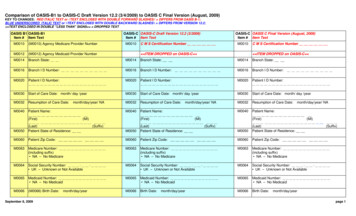
![OASIS-D Handouts [Read-Only] - Missouri](/img/30/oasis-d-powerpoint-2-slides.jpg)


